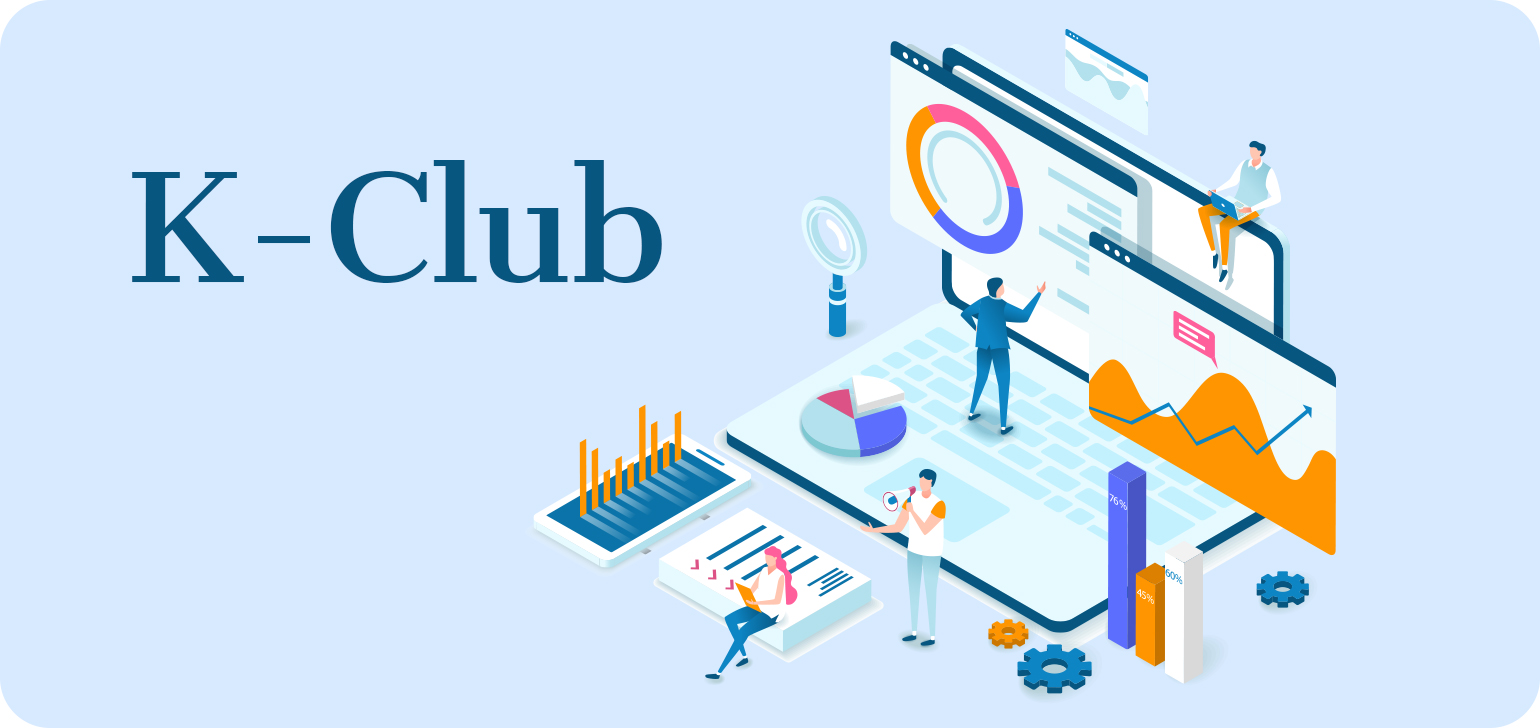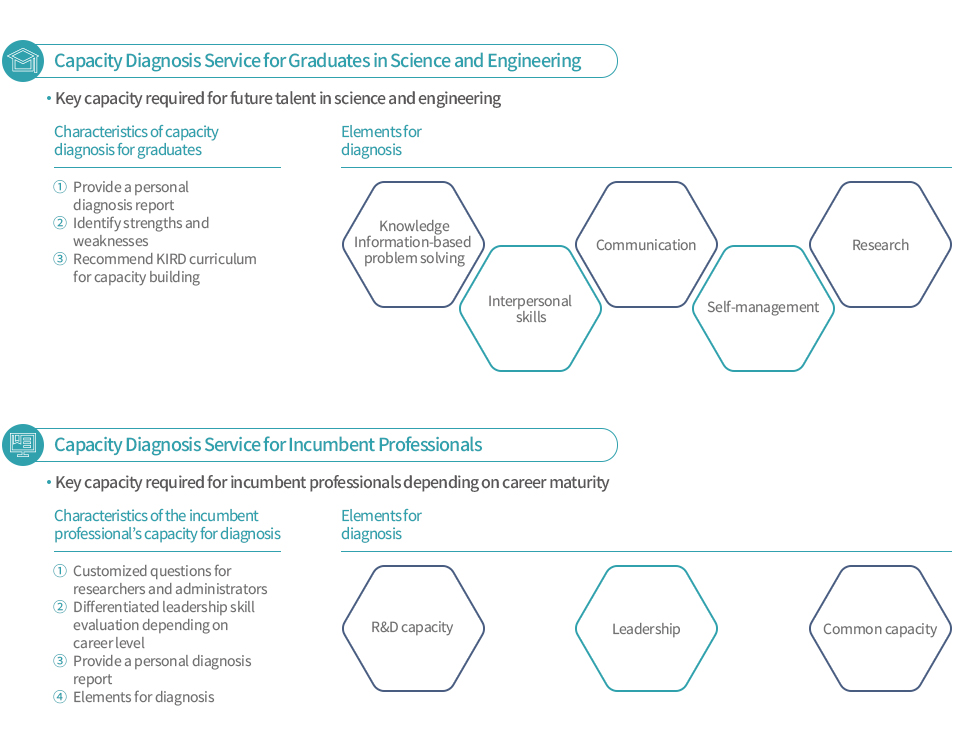VOL.03 · November 2022

VOL.03 · November 2022

Under the mission of supporting the self-directed growth of scientists and engineers, KIRD has launched and operated a career development platform named “K-Club" starting in 2019. “K-Club” is an abbreviation of “Career Level Up” and has the meaning of supporting the continuous growth, career leap, and evolution of scientists and engineers. The platform, as an enabler of career development and transition for incumbent and experienced scientists and engineers, provides customized career development information and a venue for networking among professionals from various backgrounds, ranging from industry, academia, and the research field.
Capacity diagnosis is a subject-specific diagnostic service that allows scientists and engineers to evaluate their own capacity against the required capacity level in accordance with their career maturity. Participants can diagnose their current capacity level and establish their own capacity development plan by referring to the required capacity for their desired career path.
For graduates, the program presents an opportunity to diagnose key capacities required to be future talents, their own strengths and weaknesses, and to establish their own improvement plans. For incumbent professionals, the program provides job-specific diagnostic questions as well as career-level specific leadership diagnostics.

The mentoring program for scientists and engineers started with a 1:1 format and has evolved to include long-term group mentoring. Therefore, participants are free to choose the type of mentoring they need based on their preferences and goals.
This program contributes to continuous career development and systematic utilization of resources with the help of mentors in science and engineering fields. Also, it has been a venue where highly experienced scientists can impart their ample experiences and knowledge to young scientists. Young scientists can turn to this program for their career concerns related to career development, employment, and business foundations, as well as studying abroad.
| Group mentoring-Public recruitment | Group mentoring-University collaboration | Personal mentoring | |
| Target | (under)graduates, incumbent professionals in industry, academia, and research fields, returnees, and highly-experienced professionals | Graduates in S&T | Scientists and engineers |
|---|---|---|---|
| Content | Theme selection is based on career level. Experience sharing and Q&A |
Collaboration with the university career development center Demand-based career design |
Mentee-specific 1-on-1 mentoring Problem solving and consultation |
| Method | Online video call | Online video call In-person meeting |
Experts’ comment Online video call |
| Application | Mentees apply for the mentoring course | Recruit graduates from partner universities | Applicants designate mentors with their desired mentoring areas |
The career development self-design program is divided into three different curriculums depending on target groups, including graduates, incumbent professionals, and highly experienced professionals. Each curriculum consists of the following three steps for the sake of learning efficiency: pre-training, training, and post-training.
| Curriculum | Graduates and postdocs | Incumbent professionals | Highly-experienced |
| Goals | Career formulation (career design and mentoring) |
Career advancement (career plan establishment and mentoring) |
Career transition (life design and re-entering society) |
|---|---|---|---|
| Target | Graduates and postdocs Researchers, job seekers |
Professionals in S&T (research/administration) |
Highly experienced professionals in S&T (basic/advanced, individuals who retire within 3 years) |
A self-designed career development program for graduates is provided in two forms: a regular course for career formulation for both graduates and postdocs, and a special “collaborative training” course customized for the particulars of the university.
As per incumbent professionals’ career development course, it is divided into “research” and “administration” for the benefit of participants’ career advancement. The courses offer group mentoring and career advancement options (research data analysis, job trends, etc.). The LIFE-100 Design Academy is for highly experienced professionals and aims to prepare professionals who are to retire within 3 years of time for their career transition. Participants of this program benefit from strengthening their skills and capacities required for career transition with comprehensive and various training. The courses encompass a wide variety of topics, including social participation, re-employment, entrepreneurship, communication, personal branding, lectures, and book publication.
Participants are able to listen to other colleagues' and their own experiences from different backgrounds. They share wins and losses in career development as well as knowledge and skills in the research field. This helps the participants equip themselves to explore career paths and establish career development plans. Approximately 200 contents are distributed in different formats, such as video clips, card news, and text. Also, its content search function allows the readers to select content depending on their major, background, as well as career level.

“You and I are not heading in the same direction. It is out of touch.” This is what my student mentees told me when I was mentoring them. In retrospect, I think I focused too much on their shortcomings and did not pay enough attention to their strengths. I thought that I needed to see myself clearly before I tried to be a good mentor. At that point, I came across K-Club's incumbent capacity diagnosis and career development self-design program. Through capacity diagnosis, I could objectively evaluate my current capacity and complement my shortcomings by utilizing what I had learned from my career development self-design course.
As a result, I am mentoring not only students but also other professors. One of the answers to the question “Do I have what it takes to be a good mentor?” is to know about myself. How much effort you are putting into solving mentees' concerns and problems and knowing the areas you need to work on is important. In that regard, K-Club's capacity diagnosis program and self-designed training helped me greatly.
At my previous job, my role was to support others in creating a stable research environment. I was scared that my professional growth would hit a dead end. I desperately needed help. When I finally decided to pursue other opportunities, one of my friends recommended K-Club mentoring. I was not fully convinced in the beginning. However, when I tried going on the website and checking the mentor list, I was pleasantly surprised at how various these mentors were in terms of their backgrounds and careers. I started to feel hopeful that I might be able to meet with IT experts who could help me out.
During my college years, I was able to turn to professors or classmates. However, it was not easy to find a mentor who was actually active in the field. Via the K-Club mentoring service, I was so happy to meet a mentor who is currently working in the field of my interests. Also, I was motivated and inspired by the mentor's continuous efforts for their own development. I thought I was very lucky to meet my mentor and also wanted to follow in the footsteps of my mentor so that I could share my vision with others later.
The mentoring was quite detailed and thorough, as it went beyond discussion about the job. The program dealt with various topics, including job trends and development as well as problem-solving strategies. This mentoring program was more about an “opportunity to learn growth through perspective change” than “growth through experience.”
I do not know for sure, but it may be that the reason I am currently working in the same company as my mentor is all thanks to this mentoring program. I am deeply appreciative of this program for letting me meet excellent mentors. It has been a tremendous help in my life.